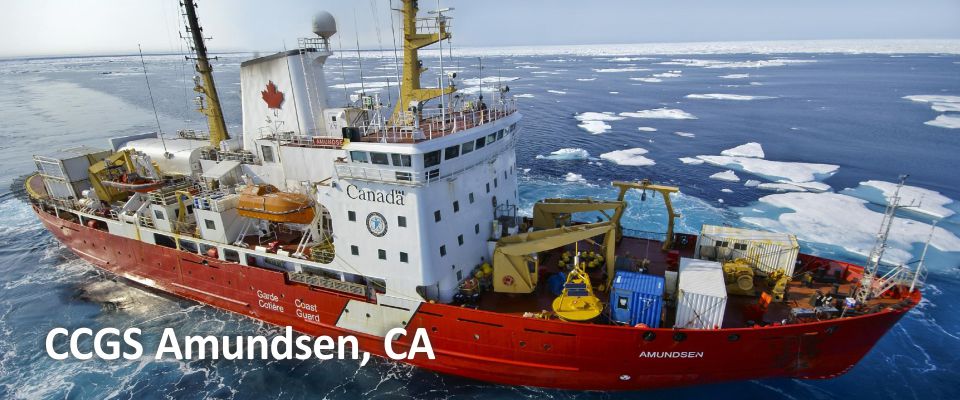Operator: Amundsen Science (partner ULAVAL)
Country: Canada
Vessel Type: Research icebreaker
Ice Class: 100 A; Arctic Class 3
Operational Area: Arctic Ocean and Canada’s ice covered seas
Endurance: 150 days
Scientist berths: 40
Length: 98m
Berths offered in ARICE: 10

Features:
The CCGS Amundsen is a Class-1200 medium-size icebreaker based in Quebec City, Canada. The electric diesel engines of the Amundsen, which generate 11155 kW, and the adjusted shape of the hull allow for navigation at 3 knots in more than 1-meter-thick ice. The vessel was designed to have great autonomy at sea: it can travel 15,000 nautical miles at cruising speed without calling port. The Amundsen is an efficient, versatile and cost-effective ship to conduct scientific research of international calibre in the Arctic and other ice covered seas. The Amundsen’s pool of specialised equipment includes 65 scientific systems and 22 on board and portable laboratories that can accommodate the needs of physical, chemical, and biological oceanographers, paleoceanographers, geologists, atmospheric scientists, remote-sensing specialists and epidemiologists.
Further information about CCGS Amundsen:
Vessel website: http://www.amundsen.ulaval.ca/
Technical characteristics: http://www.amundsen.ulaval.ca/capacity/technical-characteristics.php
Scientific equipment/labs/instruments: http://www.amundsen.ulaval.ca/capacity/scientific-equipment.php
General arrangement plan of Amundsen (here)
CCGS Amundsen operational areas:
Proposals to CCGS Amundsen will be accepted to perform multidisciplinary oceanographic studies in the following geographic regions (following the preliminary schedule for CCGS Amundsen):
2019 - Late May to early July: Northern Labrador Sea, Southern Baffin Bay
2020 - August to December: Southern and Northern Baffin Bay, North Water Polynya/Nares Strait, Lancaster Sound
2021 - July to November: Southern and Northern Baffin Bay, Baffin Bay, Northwest Passage, Southeastern Beaufort Sea
Modality of access under this proposal:
Full access to CCGS Amundsen will be offered from 2018 to the end of 2021, including the North Water overwintering (2020-2021) programme. The equivalent of seven full days of research for a team of up to ten researchers will be provided to successful candidates. Applications must fit into the proposed programmes time schedule.
Proposals selected for funding on board the CCGS Amundsen will be scheduled through the Amundsen ship-time application.
Support offered under this proposal:
- Transportation of cargo and personals
- Food and accommodation,
- Lab space and power supply,
- Communication,
- Operational and logistic supports,
- Basic data from meteorology, navigational and hydrographical observatories,
- Medical care
Scientists accessing the AMUNDSEN through ARICE will share the icebreaker and its equipment with other researchers in longer cruises.
Other considerations:
Applicants are welcomed to discuss the initial feasibility of their work while they prepare their application with the operator of CCGS Amundsen, Amundsen Science at info@as.ulaval.ca
Collaboration with Canada-based researchers is recommendable in order to develop a longer cruise, as Canada-based researchers may have access to additional funding, such as Amundsen Science ship-time subsidies or funds from the ship-time program of the Natural Sciences and Engineering Research Council of Canada.

